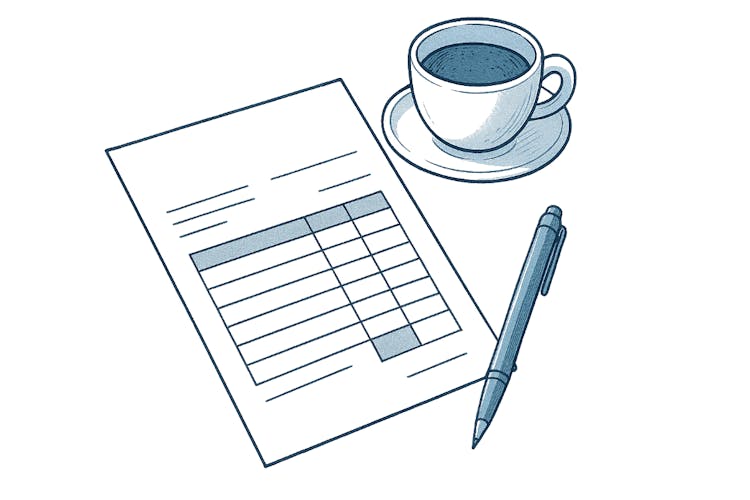For small businesses aiming for success in the UK, the ability to craft invoices with specified payment terms is vital. Such invoices not only ensure transactions are conducted promptly and correctly but also create a polished, professional impression. By clearly defining key particulars and payment conditions, you prevent misunderstandings and bolster client trust.
To construct an effective invoice:
Commence with the essentials of a professional invoice:
Clearly present your business name, logo, and contact details. Add client information, a distinct invoice number, and the date issued for accurate tracking.Clearly delineate charges:
Itemise the products or services provided, detailing descriptions, quantities, rates, and totals. Transparency is crucial to convey precisely what is being billed.Explicitly Outline Payment Terms:
Ensure the payment terms on your invoice stand out beneath the charge breakdown. State specific due dates (e.g., "Net 30" or "Due within 15 days") and mention accepted payment methods like bank transfers and digital options. Also, include stipulations for late payments, such as a "2% charge for payments over 30 days delayed." Encourage early payments by offering discounts like "2% off if settled within 10 days."Utilise Professional Terminology:
Swap ambiguous terms like “ASAP” for defined phrases such as “Payment due by [date].” This fosters clear communication and establishes a professional rapport.

Tip
Copy this transparent payment term example:
“Net 30 – Payment due within 30 days of the invoice date. A 1.5% late fee will be levied monthly on overdue payments.”
Key Payment Terms Small Businesses Should Consider:
Net 30: Payment required within 30 days.
Due upon receipt: Immediate payment demanded.
2/10 Net 30: Two percent discount if paid within 10 days; complete payment within 30 days.
The Necessity of Payment Terms for Small Business Operations
Payment terms go beyond being a mere statement on an invoice—they are foundational to financial reliability. By establishing expectations around due dates and payment platforms, the likelihood of late payments and confusions is reduced.
Did you know?
Research indicates invoices with defined payment terms encounter 20% fewer payment delays than those without clear terms.
Payment terms safeguard cash flow, enabling strategic planning for expenditures such as staff wages and supplies. They cultivate mutual respect between you and your clients, underscoring professionalism and efficiency.
Strategies for Formulating the Optimal Invoice with Payment Terms
Time-tested approaches can significantly impact how smoothly clients fulfil payments. Consider these best practices for elevating your invoicing process:
Adopt coherent, clear formatting:
Simplify reading by bolding due dates and amounts. Use consistent fonts and ample white space.Maintain a cordial yet assertive tone:
Phrases like “We appreciate your prompt payment!” foster cooperation without seeming overbearing.Automate invoicing where feasible:
Platforms like QuickBooks simplify timely invoice dispatch while including reminders.State payment options upfront:
List methods such as card payments, PayPal, or electronic transfers, encouraging convenient payments.Issue invoices without delay:
Late billing often leads to late payments, so dispatch invoices promptly upon task completion.

A Common Mistake to Avoid
“Payment is due soon.” Such vague language invites confusion. Specify: “Payment due by 15 November 2023.”
Securing Client Compliance with Your Payment Terms
Ensuring adherence to invoice terms can be one of the more challenging facets of managing a small business. Nonetheless, proactive engagement and minor adjustments can make a substantial impact.

Utilise automated reminders
Dispatch a reminder a week ahead of the payment deadline. Example: “Hello [Client Name], just a gentle reminder that invoice [#] is due on [date]. Please reach out if you require assistance with payment processing.”

Unaddressed overdue payments can swiftly spiral into severe cash flow difficulties. Overlooking such payments can convey an unintended message that tardiness is permissible, thereby denting your professional repute.
To counteract this, establish a systematic protocol:
Discuss payment terms during project negotiations.
Issue reminders before and post due dates.
Invariably apply penalties or interest for breaches of terms.
When working with regular or large-value clients, consider strategies like upfront payments or partial instalments to mitigate risks.
Why Payment Terms Are Crucial for Small Business Prosperity
Invoices with detailed payment terms are transformative for small British businesses. By enhancing predictability of cash flow, they allow for judicious resource allocation and enable growth pursuits with confidence.
Moreover, employing professional invoices cultivates trustworthiness and credibility among clientele. Consistent enforcement of payment terms strengthens relationships, minimising financial disputes.
In the grand scheme, an effective invoicing system conserves time, alleviates stress, and fosters the financial discipline imperative for expansiveness. Small measures like automating reminders or offering incentives for prompt payments can nurture enduring business resilience and improved client loyalty.
Incorporating payment terms into your invoicing strategy is more than a gesture for timely payments—it's a commitment to your enterprise's enduring prosperity.

